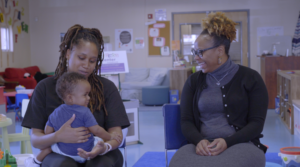Learning and Growing at IWES by Pooja Talati

The opportunity to resume interning with Meshawn Tarver, my internship supervisor, and the team at the Maternal and Child Health Division at the Institute of Women and Ethnic Studies has been amazing. Not only have I been able to see the progression of our research study My Body. My Voice. My Baby. My Support., I’ve also been able to get more involved with the study, assisting in transcribing interviews and formatting articles to eventually submit to journals. As I learn more about maternal and child health during this internship, I also understand more about the racial disparities in regards to provided information and healthcare experiences. The majority of interviews conducted over my break from interning described experiences surrounding home birthing, a topic I knew very little about at the start of the semester.
I had always assumed that hospital births would be the safest and most desired way to go through the birthing process. However, listening to interviews with birthing people who had chosen to home birth over birthing at the hospital changed that mindset. Individuals with low-risk pregnancies can safely birth at home, and for some, this option is the better one. Many mothers would rather have a natural birth, have had bad experiences with hospital births, and/or would rather be in a familiar setting when giving birth; choosing the home birthing route is the best option for them, and I honestly feel that more people would choose to home birth if given more knowledge about the process. The concept of home birthing may seem scary or dangerous to those who are unaware of the procedures and check-ins in place before, during, and after the birth. Midwives and doulas, who are both typically present during the birth, ensure at all times that the birthing person, as well as the newborn, remains safe and healthy, even planning hospital routes and considering ambulance times in case the mother and baby do require hospital attention. Many of the key informants interviewed about home birthing shared that over the course of their pregnancy they felt a strong connection with their midwives, who looked to give as many options as possible to the birthing person to give them the control during this time. In fact, I feel that medical professionals could adopt some of the ways these midwives and doulas make their patients feel comfortable, such as validating and answering any and all questions a patient might have and providing patients with options when applicable instead of telling the patient what path to follow.
Overall, the chance to get more involved in the study My Body. My Voice. My Baby. My Support. has allowed me to expand my view of the maternal and child healthcare community and to improve my writing skills on the topic. I look forward to working with Meshawn and the team over the summer when we will continue to work on writing and publishing articles based on the data collected through our interviews.
Sincerely,
Pooja Talati
